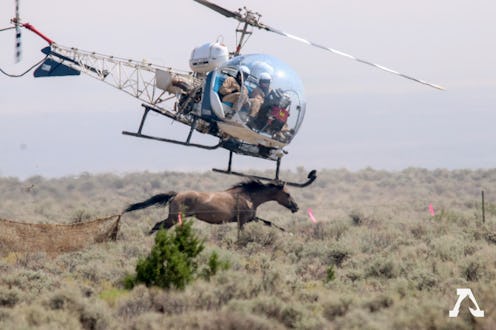Entertainment
How Wild Horses Are Fueling The Next Wave In Ecotourism
America’s wild mustangs will take center stage as ecotourism reaches $400 billion by 2028.

What if the wild horses of the American West, long a symbol of freedom and untamed beauty, could be more than just a national treasure — they could also become a major economic asset? American Wild Horses Conservation (AWHC) believes that with their striking presence and connection to the landscapes they roam, wild horses can become a new ecotourism brand, generating millions of dollars for the towns and rural communities near their roaming grounds.
AWHC advocates ecotourism as an innovative (and increasingly popular) approach to the ongoing wild horse management crisis. As the leading advocacy group dedicated to protecting wild horses and burros, AWHC believes that by using the lure of these beautiful animals, a costly management problem can become a profitable opportunity for local economies.
"Wild horse ecotourism has the potential to change everything," says Suzanne Roy, Executive Director of AWHC. "It's a win-win situation. Tourists get an unforgettable experience, local economies thrive, and wild horses remain free and protected."
The economic impact of ecotourism is forecasted to be great. According to a recent study, wild horse tourism could generate millions annually and support jobs in rural communities. This financial impact would significantly boost local economies and provide a new revenue stream to support community needs.
The ecotourism industry is expected to be a $400 billion industry by 2028. Communities surrounding national parks are already seeing growth from ecotourism and can claim a stake in that industry. In 2023, almost $24 billion was spent in towns and cities within 60 miles of national parks with over 314,000 jobs created in these communities.
"Horses in the lands that have roamed for generations are a beautiful sight," shares Roy. "We want the communities around the roaming grounds to benefit from the interest in horses and in ecotourism."
AMWC encourages the growing interest in ecotourism with America's horses for the many benefits it will bring. By promoting wild horse tourism, small towns near wild horse habitats can attract environmentally conscious travelers invested in seeing the beauty of these animals in their natural environment. Ecotours can give visitors a close-up look at wild horses for photography, observation, and education. The economic benefits include job creation, stronger local businesses, and increased revenue.
A town in Nevada already advertises wild horse ecotourism. Carson Valley, Nevada, touts the wild mustangs as a tourist attraction. Most horses are located on public Bureau of Land Management (BLM) lands, and the town promotes the trails that weave through the Pine Nut Mountains as amazing sites to view them. In fact, the Chamber of Commerce features a wild horse statue.
Ronni Hannaman, the executive director of the Carson City Chamber of Commerce, said, "Nevada isn't Nevada without its wild horses."
Countries like Iceland have already proven the success of ecotourism, turning their wild horse populations into tourist attractions. The U.S. can also transform wild horses from a management challenge into a valuable resource that increases local development.
"Ecotourism is a part of the trend of responsible travel," explains Roy. "So many tourists today want experiences that connect with nature and support conservation. Wild horse ecotourism is exactly that."
In addition to the direct economic benefits, ecotourism will shift public perception of wild horses in local communities. In addition to the direct economic benefits, ecotourism would celebrate wild horses as unique and protected part of America's national heritage. This will likely build public support for more humane and sustainable management practices.
The current management strategy for wild horses, which relies heavily on costly roundups, has been a point of contention for years. $157 million is spent annually to operate these roundups and pen the wild horses. Conservationists and animal lovers believe that there is a better solution.
"Right now, more money is spent on rounding up and holding the horses than many important initiatives," Roy says. "We are advocating a common sense approach that will actually generate funds for the communities that need it."
The recommended approach includes the development of visitor centers and educational programs that give tourists an appreciation of wild horses.
"Education is a crucial component of ecotourism," Roy emphasizes. "Once people see these beautiful animals and understand the threats they face, we believe there will be strong support for their protection."
AWHC also advocates for a more humane and economically viable management alternative to roundups: non-hormonal, reversible fertility control to manage wild horse populations. This dual approach reduces the need for dangerous roundups and also provides ecotourism as a sustainable source of income for communities.
"Our goal is to create a sustainable model that benefits everyone involved," Roy says. "We believe that with the right partnerships and investments, wild horse ecotourism can positively impact local economies while ensuring these animals are protected for future generations."
By embracing wild horse ecotourism, the U.S. can turn a problem into a source of pride, let these majestic animals roam free, and help grow the economies of local communities.
For more information on how you can support wild horse ecotourism and conservation efforts, visit American Wild Horse Conservation.
BDG Media newsroom and editorial staff were not involved in the creation of this content.